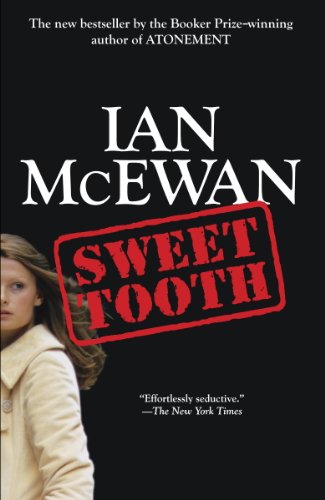
Serena Frome starts off as many young women do, choosing a collegiate career to satisfy her parent’s desires and ambitions. Pressured into attending Cambridge University’s Newnham College for a degree in Mathematics, Serena doesn’t have the depth of knowledge Cambridge requires. She spends her free time reading classic and contemporary literature, and after landing a book column in a local magazine, fancies herself something of a critic – though by her own admission she is less than a careful reader.
While finishing her degree she starts a relationship with a middle-aged professor who guides her reading, and shapes her political opinions- thereby grooming her for recruitment at MI5, the English equivalent of the CIA. Serena’s literary studies make her the ideal agent on a project code-named Sweet Tooth, where she recruits young writers fitting predetermined parameters for covertly funded MI5 grants. Her first grant recipient is Tom Haley, a talented writer struggling to publish, and supporting himself with teaching assignments. As the two become intimately involved and fall in love, Serena has a hard time deciding how much of her career should be shared with her lover.
McEwen skillfully combines elements in this compelling novel exploring the role of government agencies using culture and the arts to gauge and influence political ideologies of its constituents. But even more than it is a spy novel, it’s also a commentary on readers and reading, wrapped up in a coming-of-story. I loved the way McEwen pulls it all together. The fact that it’s set in the 1970′s doesn’t make it any less relevant to growing up, trying to decide on a life, the work place and advancing in a culture that minimizes women’s roles, and making choices that you’d like to take back. I’m pretty sure the spy agencies have continued to do their thing as well.
McEwen writes beautifully and he takes a lot of time building up Serena and giving a good idea of what goes on in her head, and includes long and detailed synopses of what she reads and how she reacts to the material. You understand how her thinking is shaped and why she acts as she does, how her beauty and intelligence affects the way she is viewed and treated, and how ultimately it influences her views of her own value and capabilities. There are clever turns in this novel (read carefully!) and a lot of discussion on how stories are created and told, and the different kinds of writers and readers. I have heard grumblings that Sweet Tooth is highly autobiographical, and not his best work. This is my first McEwen novel, so I really can’t comment, but if this isn’t his best, then bring on the rest! Highly recommended.



